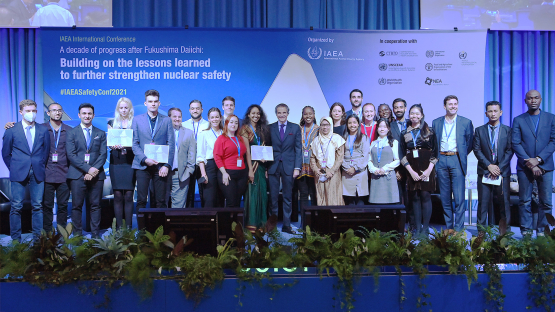Six winners of the IAEA’s nuclear safety essay contest spoke about the future of nuclear safety in power generation, the role of stakeholders in building trust with the public, and how to attract young specialists to the nuclear safety field, in a special youth panel session at the International Conference on a Decade of Progress after Fukushima-Daiichi: Building on the Lessons Learned to Further Strengthen Nuclear Safety. The conclusions of the discussion will be factored into the outcomes of the conference.
“You are the ones who are going to be taking charge of international and national safety operations. The way to best support that effort is to give you an opportunity to express your ideas, and that is why we organised this competition — to give you an opportunity to reflect and put your ideas and vision on paper,” said IAEA Director General Rafael Mariano Grossi at the panel yesterday, introducing the winners. Involving the youth in today’s discussions is important to reinforce that this is not a retrospective conversation on nuclear safety but on planning for the future and ensuring that nuclear safety continues to be a critical component of the nuclear dialogue, he added.
The young nuclear professionals from Brazil, Russia, Sri Lanka, Thailand, the United Kingdom and the United States of America who made up the winning teams discussed the impact that accidents such as Fukushima-Daiichi have had on the future of nuclear energy, and about how safety can be a tool to affect positive change in the perception of nuclear power and nuclear technologies.
Panellists said that the international community needs to maintain the momentum and continue to strengthen nuclear safety by planning for the future and understand that the nuclear industry exists in a broader context.
Earning and keeping the trust of the public is of upmost importance, said Daiane Dantas Sardinha from Brazil, adding that the development of nuclear power and its public perception are key to making an impactful change in solving global problems such as climate change. “If we fail to act as a global community on climate change, it’s going to be the youth that will be living in increasingly hostile environments,” said Travis Scott, an essay winner and panellist from the USA.
When asked about innovation and advancement in nuclear technology over the next decade, Doovaraha Maheswarasarma, panellist from Sri Lanka said: “Nuclear has been a very resilient industry, we fell back at times but also found the time and effort to come back into the picture.” Looking forward, small and modular reactors (SMRs) will help supply low-carbon electricity to rural places, she added.
Social media has played a growing role in disseminating nuclear information to the public, especially to younger generations, panellists said, and nuclear safety experts need to learn to better communicate through this medium, said Sardinha. “There’s a lot of good information about nuclear but it’s also too technical. To reach the new generation, we need to present nuclear data and knowledge in a more appealing and easier way to understand — through social media,” she added.






